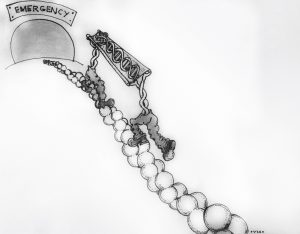Search Results for: periphery
Nervous System
THE is the most complicated and highly organized of the various systems which make up the human body. It is the... Read More
Afferent neuron
Definition noun, plural: afferent neurons A type of neuron that detects stimulus from the periphery and relays nerve... Read More
Afferent Nerve
Afferent Nerve Definition The word ‘aferent’ means "steering or conducting something towards a destination". The... Read More
Allopatric speciation
We can define speciation as a process by which the novel genetically independent group of organisms are formed through the... Read More
Metaphloem
Definition noun, plural: metaphloems A component of the primary phloem that develops often following the differentiation of... Read More
Accretions
Accretion 1. Increase by addition to the periphery of material of the same nature as that already present; e.g., the manner... Read More
Macula lutea
Macula lutea An oval area in the retina, 3 to 5 mm in diameter, usually located temporal to the posterior pole of the eye... Read More
Peripheral membrane protein
Definition noun, plural: peripheral membrane proteins A protein that temporarily adheres to the biological membrane, either... Read More
Protoxylem
Definition noun The first xylem to develop from the procambium, and characterized by narrow tracheary elements with annular,... Read More
Superficial cleavage
Definition noun (embryology) A meroblastic cleavage wherein mitosis occurs without cytokinesis, resulting in many nuclei,... Read More
Megakaryocyte
Definition noun, plural: megakaryocytes A large cell in the bone marrow with characteristic lobulate nucleus and is... Read More
Primary phloem
Definition noun The type of phloem derived from the primary meristem during the development of a vascular... Read More
Efferent nerve
Definition noun, plural: efferent nerves The type of nerve that carries nerve impulses away from the central nervous system... Read More
Motor neuron
Definition noun, plural: motor neurons A type of neuron connected to a muscle fiber and originates from the central nervous... Read More
Anterolateral system
Definition noun A composite bundle of fibers in the ventral half of the lateral funiculus of the spinal cord, and comprised... Read More
Facultative heterochromatin
Definition noun Heterochromatin that may lose its condensed state and becomes genetically active Supplement Heterochromatin... Read More
Erythrocyte
Erythrocyte Definition Erythrocytes (red blood cells or RBCs) are the myeloid series of specialized cells that play an... Read More
The Conscious & Unconscious Nervous System
The Central Nervous System is arguably the most important part of the body because of the way it controls the biological... Read More
How cell fixes DNA damage
DNA repair strategies DNA is crucial to life. It carries the fundamental blueprint for the proper functioning of a cell.... Read More
Sympatric speciation
Speciation is a process of evolution through which two different existing populations evolve and a distinct species form. It... Read More
Peripheral
peripheral (Science: anatomy) Pertaining to or situated at or near the periphery, situated away from a centre or central... Read More
Vitreous humor
Definition noun The clear, gel-like body fluid in the vitreous chamber, i.e. the posterior cavity between the lens and the... Read More
Cell membrane
Cell Membrane Definition Just like any non-living body possesses a plastic or paper packaging material that keeps the... Read More
Castration cells
Castration cells Altered basophilic cells of the anterior lobe of the pituitary that develop following castration; the body... Read More
Micrometer
micrometer An instrument, used with a telescope or microscope, for measuring minute distances, or the apparent diameters of... Read More
Heterochromatin
Definition noun Highly condensed, tightly packed form of chromatin, as opposed to the lightly packed... Read More
Tigroid retina
tigroid retina --> tessellated fundus A normal fundus to which a deeply pigmented choroid gives the appearance of dark... Read More
Membrane protein
Definition noun, plural: membrane proteins A type of protein that is attached to, or associated with, a biological... Read More
Langhans giant cell
Definition noun, plural: Langhans giant cells A type of giant cell formed by the fusion of epithelioid macrophages, and... Read More














